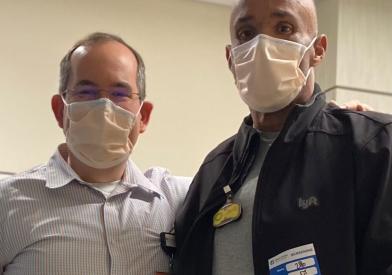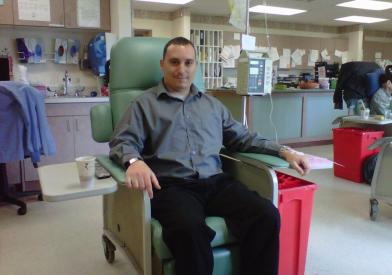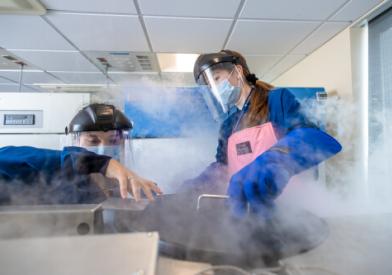CAR T-Cell Therapy for Leukemia
CAR T-cell therapy is FDA-approved for patients with relapsed or refractory B-cell acute lymphoblastic leukemia (ALL). Patients are evaluated carefully to determine if this therapy is appropriate for them, and are cared for by a team experienced in CAR T-cell therapy.
In addition to the FDA-approved therapy, Dana-Farber Brigham Cancer Center also offers clinical trials evaluating CAR T-cell therapy for other types of leukemia, as well as other blood cancers.
Eligibility Criteria for CAR T-Cell Therapy for Leukemia
- Confirmed diagnosis of B-cell acute lymphoblastic leukemia (ALL) that has either not responded or has relapsed after one line of prior treatment.
- Adequate organ, cardiac, and pulmonary function (must meet established criteria/measures).
- Children and young adults may also be evaluated at Dana-Farber/Boston Children's Cancer and Blood Disorders Center (Dana-Farber/Boston Children's).
Learn more about CAR T-Cell Therapy for childhood leukemia.
CAR T-Cell Therapy for Lymphoma
CAR T-cell therapies are FDA-approved for several types of relapsed or refractory non-Hodgkin lymphoma:
- Aggressive relapsed or refractory large B-cell lymphoma including diffuse large B cell lymphoma (DLBCL), primary mediastinal B-cell lymphoma, high-grade B-cell lymphoma, and transformed follicular lymphoma.
- Relapsed or refractory mantle cell lymphoma
- Relapsed or refractory follicular lymphoma
- Relapsed/refractory chronic lymphocytic leukemia (CLL) or small lymphocytic lymphoma (SLL)
Our program also offers patients clinical trials of CAR T-cell therapy for other forms of lymphoma as well as trials of CAR T-cell therapy earlier in treatment and in combination with other immunotherapies.
Eligibility Criteria for CAR T-Cell Therapy for Lymphoma
Patients who meet the following eligibility criteria may be appropriate for CAR T-cell therapy:
- Confirmed diagnosis of DLBCL, primary mediastinal large B-cell lymphoma, high-grade B-cell lymphoma, or transformed follicular lymphoma to DLBCL that has relapsed or not responded to at least two prior lines of systemic therapy, if the initial response to first-line therapy was longer than 12 months.
- Patients with these diagnoses who do not achieve remission or relapse within 12 months of first-line therapy are eligible for CAR T as a second-line therapy.
- Patients with DLBCL that has relapsed or not responded to first-line treatment and are not eligible for stem cell transplant are eligible for CAR T as a second-line therapy.
- Confirmed diagnosis of follicular lymphoma that has relapsed or not responded after two prior lines of treatment.
- Confirmed diagnosis of mantle cell lymphoma that has either not responded to, or relapsed after first line of therapy
- Confirmed diagnosis of chronic lymphocytic leukemia (CLL) or small lymphocytic lymphoma (SLL) that has relapsed or not responded to at least two prior lines of therapy, including a Bruton tyrosine kinase (BTK) inhibitor and a B-cell lymphoma 2 (BCL-2) inhibitor.
Patients are evaluated carefully to determine if this therapy is appropriate for them.
Patient Stories
CAR T-Cell Therapy for Multiple Myeloma
CAR T-cell therapy is FDA-approved for multiple myeloma that has relapsed after or is refractory to at least four prior treatments. Dana-Farber Brigham Cancer Center is a leader in bringing new CAR T-cell therapies to patients in need and led the clinical trial that led to FDA approval of CAR T for multiple myeloma. The clinical trial showed the CAR T-cell therapy to be highly effective for patients whose disease had relapsed after or not responded to multiple prior treatments.
Eligibility Criteria for CAR T for Multiple Myeloma
Patients who meet the following criteria may be appropriate for CAR T-cell therapy:
- Confirmed diagnosis of multiple myeloma that has either not responded or has relapsed after four or more prior lines of treatment.
- Therapy must have included a proteasome inhibitor, an immunomodulatory drug, and an anti-CD 38 monoclonal antibody.
Patients must have a referral from their oncologist to Dana-Farber Brigham Cancer Center's Jerome Lipper Multiple Myeloma Center to be evaluated for CAR T-cell therapy.
As a new product, there may be limited availability of CAR T-cell therapy for multiple myeloma. Your physician will discuss this with you and whether clinical trials of other CAR T-cell therapies may be options.
Frequently Asked Questions
What Is Chimeric Antigen Receptor (CAR) T Cell Therapy?
Chimeric antigen receptor, or CAR T-cell therapy, is a form of immunotherapy that uses specially altered T cells — a part of the immune system — to fight cancer. A sample of a patient's T cells is collected from the blood and then modified to produce special structures called chimeric antigen receptors (CARs) on their surface. When these CAR T cells are reinfused into the patient, the new receptors enable them to latch onto a specific antigen on the patient's tumor cells and kill them.
After a sample of a patient’s T cells has been collected from the blood, the cells are re-engineered so they sprout special structures called chimeric antigen receptors (CARs) on their surface. When these CAR T cells are reinjected into the patient, the receptors may help the T cells identify and attack cancer cells throughout the body.
What Is the Treatment Process for CAR T-Cell Therapy?
CAR T-cell therapy is a complex, multi-step process:
- Evaluation: Patients undergo a series of tests and screenings to determine if CAR T-cell therapy is an appropriate treatment option.
- Collection: T cells are collected from patients via leukapheresis, a process that withdraws blood from the body, and moves through a cell separator to collect the needed blood components, in this case T cells. The remaining blood components are then returned into the body. The procedure is done in one day in a clinic at the Kraft Family Blood Donor Center at Dana-Farber Cancer Institute and Brigham and Women’s Hospital.
- Engineering: The T cells are sent to a laboratory where they are genetically engineered to target a specific type of cancer.
- Multiplication: The genetically modified T cells are “expanded” by growing cells in the laboratory until there are millions of them. The process of engineering and growing sufficient quantities of CAR T cells can take a few weeks. When there are enough of them, the CAR T cells are frozen and sent to the hospital or center where the patient is being treated. At our center, these cells are returned and processed at Dana-Farber’s Connell and O’Reilly Families Cell Manipulation Core Facility.
- Conditioning Therapy: Prior to infusion of the CAR T cells, patients may receive chemotherapy for their cancer. This helps to create space in your immune system for the infused CAR T cells to expand and proliferate.
- Infusion: When the CAR T cells are ready, the cells are infused through a central line, in a process similar to a blood transfusion. Patients may receive medications to prevent and control possible side effects of the newly-engineered cells. Patients may receive their CAR T cells in the hospital or in the outpatient clinic. The patient’s physician will decide which approach is best.
- Recovery: Patients who receive CAR T-cell therapy have a risk/recovery period of approximately 2 to 3 months. During this period, patients will be evaluated for side effects and treatment response. It is not uncommon for patients to be admitted to the hospital during this period to manage complications from treatment. During the first 30 days after CAR T-cell infusion, patients need to remain close to our center for regular follow-up care. A resource specialist can assist in arranging for a place to stay during this time, if needed.
Throughout the entire process, careful measures are in place to ensure patients’ safety.
Learn more about how CAR T-cell therapy works and the treatment process at Dana-Farber.
What Are Possible Side Effects of CAR T-Cell Therapy?
Although most patients do not experience the common side effects associated with chemotherapy such as hair loss, nausea, and vomiting, there are risks of significant side effects with CAR T-cell therapy.
Possible side effects from CAR T-cell therapy include:
- Cytokine release syndrome: CAR T cells can initiate a massive release of substances called cytokines, which triggers an inflammatory condition known as cytokine-release syndrome (CRS). Symptoms may be flu-like, with a high fever and/or chills; low blood pressure; difficulty breathing; or confusion. These symptoms can be mild or severe.
- Neurologic difficulties: Patients may also experience confusion, difficulty understanding language and speaking, or stupor.
Patients are monitored closely to manage reactions to this therapy. The complications are generally temporary and resolve with treatment. Our care team is specially trained to identify and manage these side effects.
Read more about potential side effects of CAR T-cell therapy
How Long Does it Take to Recover from CAR T-Cell Therapy?
Recovery can take time as your immune system recovers. The acute recovery period is typically for 30 days after the CAR T-cell infusion. During this time, patients must remain within two hours of Dana-Farber Brigham Cancer Center, and must have a caregiver with them at all times to monitor for signs of fever, infection, and neurologic difficulties. Most patients feel tired and don't have much appetite during this period.
Is CAR T-Cell Therapy Covered By Insurance?
Coverage is reviewed on a case-by-case basis, as is typical for new therapies. We work with patients and insurers to seek health insurance coverage for clinically-eligible patients.
Emerging Research: What’s Next for CAR T-Cell Therapies?
Combining CAR T with other Therapies
Studies are exploring ways to improve the effect of CAR T cells by combining them with other immunotherapies such as checkpoint inhibitors or NK cells. In addition, teams are using CAR T either before or after stem cell transplant to optimize outcomes.
Minimizing Side Effects
In one study, investigators are testing CAR T cells that target “checkpoint” proteins on tumor cells in combination with defibrotide, a drug that prevents blood clots, or the immunosuppressive drug anakinra. Other studies are exploring the potential of new agents like siltuximab. Researchers are also testing alternate dosing and treatment schedules for standard medicines for CAR T cell-related side effects in an effort to find the optimal approach.
Timing of CAR T-Cell Therapy
Currently, CAR T-cell therapies are approved for patients who have relapsed after initial treatment. Studies are underway looking into whether CAR T-cell therapy is most effective as an early-stage or later-stage treatment.
Allogeneic CAR T—Using a Patient’s Own T Cells
Current, approved CAR T products use a patient's own T cells and re-engineer them to target cancer cells. The manufacturing time can take 2-3 weeks. Trials are exploring using donor-matched, or allogeneic CAR T cells that could be pre-manufactured and ready, off the shelf for patients in need.
Correlative Research
Scientists are conducting "correlative" studies to determine how well CAR T cells make their way to tumor tissue and how effectively they function once there.









